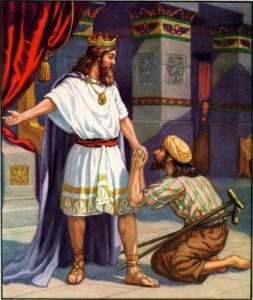
The Bible is loaded with interesting stories. They aren’t recorded just for our entertainment, though. Scripture says, “Whatever was written in earlier times was written for our instruction, so that through perseverance and the encouragement of the Scriptures we might have hope” (Romans 15:4).
I want to share a lesser-known Bible story that will touch your heart. It is about a young man named Mephibosheth. I know that it can fill you with “encouragement” and “hope.” I’m sure you will agree that even if we never felt like we needed those things before, we surely need them now!
Here is the setting of the story about Mephibosheth.
Saul was the first king of Israel. You can read about his life in I Samuel 12-15, 18-20, 24, 26-31. He was tall and good looking and he started his reign with a humble heart before God. It seems, though, that the power of being king gradually went to his head. He turned his heart away from the Lord, showed signs of being self-centered and hateful, and even became mentally unstable. After reigning for almost 40 years, Saul and his son Jonathan were tragically killed in a battle with the Philistines at Mt. Gilboa.
Because David had been anointed as the next king of Israel many years before, he was soon recognized as Israel’s king. It was the custom in those days for kings to kill any remaining descendants of the previous king so they couldn’t claim any right to the throne. David, however, made no move to do that.
Later, King David discovered that a grandson of Saul was still living. His name was Mephibosheth, and he was the son of Jonathan who was the son of Saul. He was now grown with a son of his own. When David learned where he was living, he summoned him to Jerusalem.
We can only imagine what Mephibosheth must have been thinking when he heard that King David wanted to see him. Was he coming to Jerusalem to be killed? Mephibosheth had been hiding out in the town of Lo Debar which means “land of nothing.” Jerusalem was a big, beautiful city. Was that where he was going to die?
What happened when Mephibosheth met David?
“David said to him, ‘Do not fear, for I will surely show kindness to you for the sake of your father Jonathan, and will restore to you all the land of your grandfather Saul; and you shall eat at my table regularly’” (2 Samuel 9:7). A few verses later we learn that Mephibosheth was “…lame in both feet” (2 Samuel 9:13).
What an unexpected turn in the story! King David did not have him executed, and he also gave him all the property that had belonged to his grandfather. He even welcomed him to feast daily at his table for the rest of his life.
Why did David do that? There is only one reason why David decided to be so generous to Mephibosheth: pure grace! Mephibosheth had no way to repay David. Because he was crippled, he couldn’t even offer to work for David to repay him.
Here is where we can experience “encouragement” and “hope.” That story is a glorious picture of what Jesus offers to us sinners today. Let’s look at some fascinating parallels.
David reached out and found Mephibosheth. It wasn’t the other way around. God reaches out to us, even before we see a need for Him. One day Jesus looked at His followers and said, “You did not choose Me but I chose you….” (John 15:16). God declared: “I permitted Myself to be sought by those who did not ask for Me; I permitted Myself to be found by those who did not seek Me ….” (Isaiah 65:1).
Be encouraged. God is looking for His followers before they even look for Him. “We love because He first loved us” (1 John 4:19). Also see Ephesians 1:4-5
Notice, too, that just as crippled Mephibosheth was unable to do anything to earn David’s generosity, so we can’t do anything to deserve Christ’s forgiveness. We will never be able to repay what He has given us. “For by grace you have been saved through faith; and that not of yourselves, it is the gift of God; not as a result of works, so that no one may boast” (Ephesians 2:8–9).
Christ’s gift of salvation to us is even better than what Mephibosheth received. David’s generosity only lasted until Mephibosheth died. The gift of salvation that God offers to us, though, is “… according to His great mercy [and] has caused us to be born again to a living hope through the resurrection of Jesus Christ from the dead, to obtain an inheritance which is imperishable and undefiled and will not fade away, reserved in heaven for you” (1 Peter 1:3–4). God’s grace to us is a gift that lasts forever!
I began by asking, “Are you a type of Mephibosheth?” No matter how you answer that question, I want you to know that I see myself as a type of Mephibosheth.
I have no goodness of my own that makes me worthy of God’s holiness. With Paul I can say that I must “be found in [Jesus], not having a righteousness of my own derived from the Law, but that which is through faith in Christ, the righteousness which comes from God on the basis of faith” (Philippians 3:9).
I hope with all my heart that you too will see yourself as a type of Mephibosheth. I want you to accept the goodness that God is offering to you.

Leave A Comment